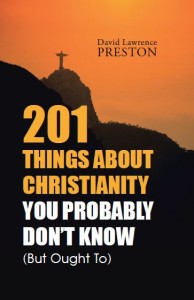Christianity has always had an uneasy relationship with science. Many scientific discoveries have appeared to question the very basis of this religion.
The problem for Christians is that some of the statements in the Bible are just plain WRONG. For example, at the time the Genesis creation stories were written, the Hebrews believed that the Earth at the centre of the universe, it was flat and covered by a dome above which were ‘the waters’. Occasionally the dome leaked (it rained). The sun and stars were fixed to the inside of the dome, and below the ground was the place of the dead, portrayed by the ancient Greeks as Hades.
It’s hardly worth stating that we know better now.
In the Middle Ages, scientists were harshly treated for publishing theories which were perceived to contradict Biblical teachings. Nicolaus Copernicus (1473 – 1543) published an astronomical model in 1543 which had the sun at the centre of the universe and the Earth and the other planets rotating around it. He did not attract the censure of the Catholic Church at the time, but Galileo Galilei (1564 – 1642) was not so lucky a century later when he propounded a similar view. The church declared his findings false and contrary to scripture and forbade him to promote his theory.
Galileo later defended his views in his ‘Dialogue Concerning the Two Chief World Systems’, which angered the Pope and the Jesuits, both of whom had supported him up until this point. He was tried by the Holy Office, found guilty of heresy and forced to recant. He spent the rest of his life under house arrest. It took 359 years to rectify this wrong. In 1992, Pope John Paul ll acknowledged in a speech that the Catholic Church had erred in condemning him.
For several hundred years, science and religion staged an uneasy standoff. Scientists avoided making contentious statements about religion and vice versa. Then came Charles Darwin, the author of ‘The Origin of Species’. He was declared ‘an enemy of God’ for daring to advocate a theory that refuted the church’s view of creation. Even so, he never lost his belief in a creative force behind the universe. He wrote, ‘When I wrote The Origin of Species, my faith in God was as strong as that of a bishop.’
Some pioneers of science had no difficulty seeing science and religion as compatible. Albert Einstein was viewed as a heretic by the church, yet he had a profound belief in a universal mind, spirit or creative intelligence that transcended the universe and was beyond our comprehension. He and many others, including Sir Isaac Newton and the ‘Father of Quantum Mechanics’, Max Planck, shared a sense of humility and awe at what they discovered in the natural world and gave the credit to this creative intelligence.
Nowadays the church is more comfortable with scientific research. The Catholic Church, for instance, employs ordained scientists to investigate such diverse subjects as the big bang, epigenetics and global warming, but their starting point is always the Bible teachings. They seek to fit the data to the Bible teachings, not find the best explanation that fits the data. We are without doubt gaining a greater understanding of how the material universe works, but are no nearer to understanding why the universe is as it is than were the ancient Hebrews or Greeks.
©David Lawrence Preston, 12.6.18
Follow me on Facebook and Twitter @David_L_Preston


